Research

Our central research question is: “How do the coupled processes of fluid flow, solute transport, geochemical reactions, and microbial metabolism influence each other within various geological structures at different scales?” To address this, we employ a combination of theoretical, computational, experimental, and field-based approaches.
Our current research topics include:- Microfluidic investigations of microbial denitrification
- Surface water and groundwater interactions in karst aquifers
- Carbonate rock dissolution and precipitation
- Data assimilation and machine learning applications for hydrogeological characterization
Our research is driven by a commitment to fostering collaboration across diverse areas of expertise. We actively partner with researchers in microbiology and hydrogeochemistry, through which we pursue innovative and interdisciplinary breakthroughs in hydrogeology.